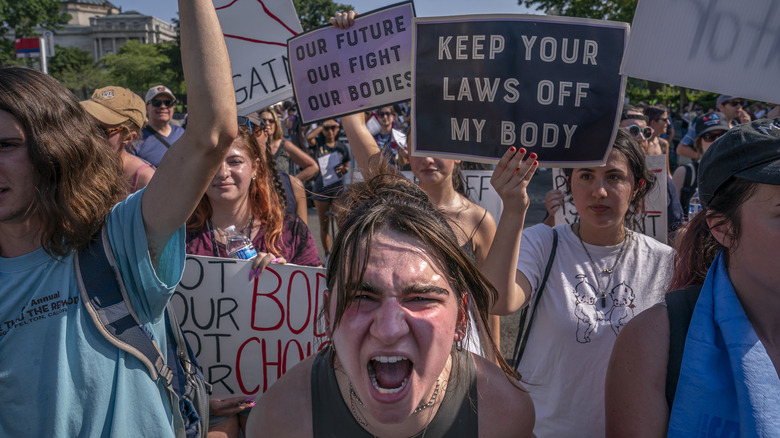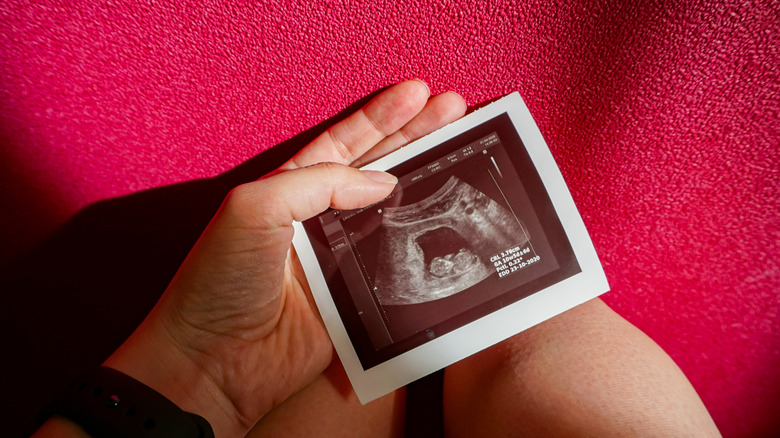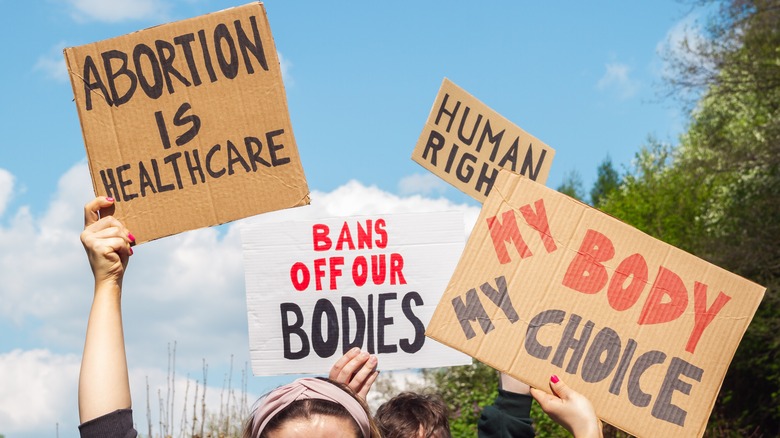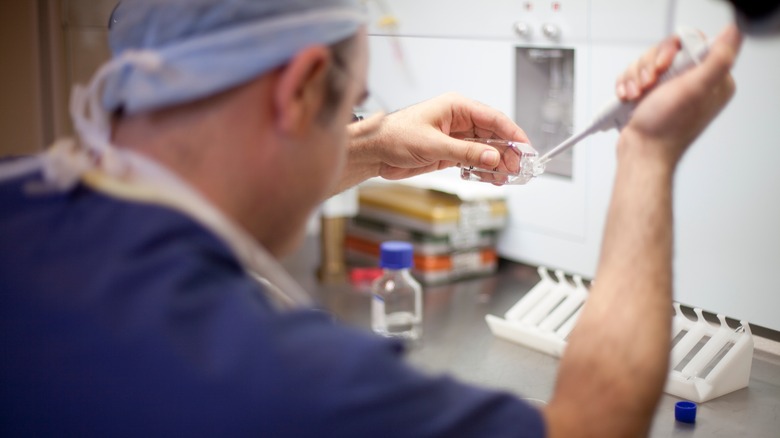Legal Expert Breaks Down The Far-Reaching Effects Of The Roe V. Wade Reversal - Exclusive
On June 24, the United States Supreme Court made a 6-3 ruling in the Dobbs v. Jackson Women's Health Organization case, making access to abortion in the United States dependent upon the state you live in (via CBS News). The United States joins Poland, El Salvador, and Nicaragua as the only countries since 1994 to restrict access to abortions, per The New York Times. Meanwhile, 59 countries have expanded access to abortions since the aforementioned year.
The ruling not only reversed 1973's landmark Roe V. Wade – which Reuters explains reinforced a person's constitutional right to personal privacy, allowing them to terminate their pregnancy if they choose — but also the 1992 decision in Planned Parenthood of Southeastern Pennsylvania v. Casey. The ruling in Casey made it illegal for states to restrict access to abortion to extreme levels, per Reuters, such as forcing patients to have to travel out of state. Now, that's the reality many abortion patients face, which impacts low-income patients especially.
Roe and Casey's repeals have much larger consequences than just allowing states to ban abortion, and we turned to Los Angeles-based attorney Christa Haggai Ramey for insight. "This means HIPPA laws protecting our medical privacy are in jeopardy," Haggai Ramey told The List. "This could mean that Griswold v. Connecticut could be in jeopardy, meaning birth control could be taken away. LBGTQ rights are in jeopardy," she added, echoing what Justice Clarence Thomas already alluded to wanting to do: revisit the landmark cases that legalized contraception, gay marriage, and sodomy.
Experts say reversing Roe v. Wade will increase burden on healthcare systems
Many states are preparing for an influx of out-of-state patients who will need abortion services. Kayla Herring, director of public affairs for Planned Parenthood of the Rocky Mountains, told The Albuquerque Journal that New Mexico's healthcare system was already in crisis before the Roe reversal, with services including reproductive healthcare. New Mexico is bordered by states have already banned — or will be banning — abortion, making it a haven for patients seeking services.
The numbers of patients New Mexico saw had already been increasing before the Dobbs decision came down on June 24. The Albuquerque Journal reported that in the time since Texas restricted services, New Mexico's Planned Parenthood has seen patients increase from 400 a year to 1,700, with wait times jumping from 24 hours to weeks. Jessica Levinson, director of Loyola Marymount University's Journalist Law School and Public Service Institute, told KTLA 5 that California, too, is planning not just for a tidal wave of patients, but they are also trying to prepare for the extra stress that abortion providers are going to face.
Abortion bans, Forbes points out, will also impact medical residency programs, nearly half of which are located in states with trigger laws that have gone into effect. In 2020, 92% of doctors in residency programs had access to training on abortion services. Researchers expect that to drop to only 56%, per Forbes.
Roe v. Wade's reversal may limit access to miscarriage care
Restricting medical training when it comes to abortive procedures additionally limits training for how to manage miscarriages, per CNN. Holli Jackalow, an OB/GYN at Columbia University, explained to Bloomberg that in some cases, miscarriages "develop slowly" and doctors may choose to perform an abortive procedure to remove the tissue and rid the risk of complications for the patient. If left to happen naturally, TIME explains, the miscarriage process can take weeks or months — and even then, there's a risk of an incomplete miscarriage.
Patients in Texas have already been experiencing the stress of abortion limitations. Since Texas's SB8 went into effect, TIME reports patients have been denied treatment for "miscarriages, ectopic pregnancies, and severe pregnancy complications," for the sole basis that the treatment options are categorized as abortion. To treat ectopic pregnancies — when an egg implants outside the uterus, making it non-viable — providers are risking breaking the law if they perform an abortion.
But it's medications, too, that providers and pharmacies are denying patients as well. Since pharmacies can be liable for selling prescriptions to patients who may be lying about having a miscarriage, per TIME, they've stopped selling abortion and miscarriage medications altogether.
Can states really ban the abortion pill?
Christa Haggai Ramey, a Los Angeles-based attorney, told The List that reversing Roe can also restrict healthcare access for transgender or transitioning patients, and can "change the right to birth control, the abortion pill, and so many other private medical decisions."
While federal law in theory overpowers state laws, everyone from abortion advocates to Attorney General Merrick Garland believes that states will try to fight the federal government about whether or not patients will have access to abortion pills.
In a statement released on June 24, Garland wrote that "[S]tates may not ban Mifepristone based on disagreement with the FDA's expert judgment about its safety and efficacy." Patients had expanded access to Mifepristone, a type of abortion pill, after the FDA lifted the in-person appointment requirement for being prescribed the medication, per Politico.
While the abortion pill is only able to be used to terminate pregnancies that are up to 10 weeks along, this type accounts for half of the country's abortions, per the Guttmacher Institute. The FDA expected access during the COVID-19 pandemic to increase, Politico explains, allowing patients to meet with doctors virtually in order to be prescribed abortion pills. Abortion advocate group Plan C explains patients have the option of having abortion medications mailed directly to them after telehealth appointments, or from online pharmacies.
Even before Roe was reversed, however, 19 states had already banned patients from being able to access abortion care virtually, per Politico.
What reversing Roe v. Wade will mean for IVF patients
Whether or not states are allowed to ban a federally approved abortion medication, like Mifepristone, is still up for debate. Rachel Rebouché, interim dean of Temple University's law school, told Mother Jones that since the FDA has approved not just the medications needed for abortions, but approved virtual appointments being safe, states may not be able to override the federal rule.
Reversing Roe v. Wade may affect patients trying to get pregnant, too. Some states with abortion restrictions and bans on the books already have been careful to make exceptions to "IVF and assisted reproductive technologies," per The Washington Post. But of the 83 bills that have been passed since 2010, 45 don't include these protections, leaving many questioning the future of the fertility industry.
Right now there's a lot of uncertainty. Los Angeles-based attorney Christa Haggai Ramey told The List that she could "imagine a situation where fertilized eggs cannot be destroyed or used for medical research." Adam Wolf, a fertility attorney for Peiffer Wolf Carr Kane Conway & Wise, echoed the same sentiment in a statement to CNN, adding that this opens the door to questions about whether a lab will be charged for manslaughter if they discard embryos.
The Washington Post also points out that new abortion restrictions and regulations could hinder IVF patients from being able to have embryos tested before they're implanted, adding to the difficulty and cost of an already dangerous and expensive process.




